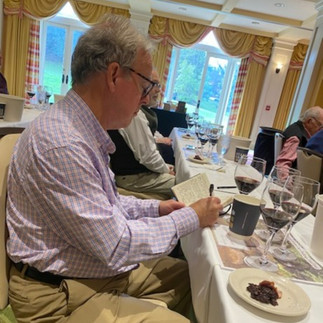Norton is not just any grape; it's VIRGINIA'S grape, named Virginia Seedling by its creator Dr. Daniel Norton. It's been around since Jefferson. It won a huge award in the World's Fair or something. It's something different! It's not Chardonnay! It's not French!
And that may explain Virginia's up/down interest in planting Norton over the years. Chardonnay pays the bills, but Norton is our grape. It's our heritage. Let's do this.
Unfortunately, public perception has often been this. (In short: not good.) Even some winemakers who make Norton wine freely admit they don't like it. The wine can be just too...too. Too grapey, too acidic, too foxy (despite the party line that says it's not). It has its proponents, certainly; VirginiaWine.org lists thirty wineries selling Norton--about 10% of all wineries. Often, it's used to make port-style dessert wines, or
What does a really good Virginia Norton taste like anyway?
Is it even worth the ink and brain space to keep talking about it when there are so many other exciting things happening in Virginia viticulture?
Then in November, So it was interesting to learn there would be a Norton Cup Challenge.
As part of the Omni Homestead Resort's commitment to showcasing Virginia wine [which I wrote about here], Homestead boss Mark Spadoni hit on an idea to honor Virginia's grape: a Norton Cup Challenge. "As my knowledge of Virginia wines has grown," he said, "I realized that the Norton grape has played an integral role in American wine and created some interesting, complex and high-quality wines. Developing this ‘challenge’ honors the grape that has been so central to the Virginia wine industry."
And so Fred Reno (Fine Wine podcast) and Dr. Bruce Zoecklein (Emeritus Professor of Enology at Virginia Tech University), put together a competition, securing ten bottles of Norton, vintages 2017 to 2020. Qualified judges were enlisted. A blind tasting ensued. Ten wines were whittled down to four. Then at the Homestead's recent Epicurean Classic weekend those four finalists were poured for the public: Chrysalis Vineyards (from their biggest-in-the-world Norton vineyard), Casanel Vineyards, Williamsburg Winery, and DuCard Vineyards. All had been working with the grape for years.
A good, simple definition of Norton is this: wines that are richly colored with fruity aromas that pair nicely with red meat, wild game or hearty cheeses. I kept that in mind as I sipped, slurped, and swirled, noting that all had the usual (gorgeous) deep red color, and the flavor of ripe cherries. (I never get the apple flavor the variety is known for, from its high malic acid.) Then the differences began to announce themselves.
One's acidity showed as sour (my particular sensitivity; others didn't notice it), two were lighter-bodied than I'd expect. Still, all were good and deserving of a spot in anyone's cellar. Then round two: taste the four again, paired with a bit of smoked duck with cherry compote. And this time, there was a clear winner. Deep red in the glass, rich dark fruit, velvet on the tongue. It squared its shoulders and said, in a lovely James Bond-y sort of way, I'm your guy. You are some tasty wine, I agreed. A holiday table kind of wine. Maybe cuddled up to a leg of smoked turkey. Or a fine Virginia ham.
DuCard Vineyard's 2017 Estate Norton took first place, but the whole team proved a point. It's time to re-start the conversation; in the right hands, Norton can absolutely be what so many hoped. And it deserves a place on Virginia's tables.
P.S. - The winning wine was made by French winemaker Julien Durantie. Which you have to admit is pretty darn amusant.
(For the whole Norton story, get Todd Kliman's book The Wild Vine: A Forgotten Grape and the Untold Story of American Wine, which features Middleburg's Chrysalis Vineyards. Dave McIntyre had some hopeful things to say also in The Washington Post a while back.)






Comments